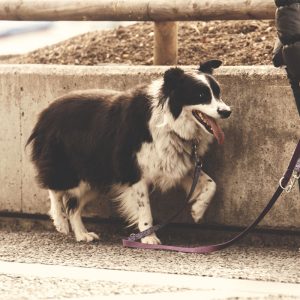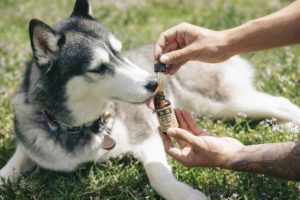“Let sleeping dogs lie,” right? That’s the old saying, anyway. When does sleep cross over into something more? Considering a dog averages between 10-14 hours of sleep a day, the line gets blurry. Lethargy isn’t just a few extra hours of shut-eye, though. In fact, lethargy crosses over into your dog’s waking hours, which is when you’ll get concerned. If you think your dog is lethargic, expect a trip to the vet in your near future.

Defining Lethargy
So what is lethargy? According to Dr. Kimberly Hammer, an Internal Medicine Specialist and Medical Director at NorthStar VETS, lethargic dogs are less interested in their daily activities, including walks and playtime. They also withdraw from you and your children.
“He or she may be less interested in his or her surroundings, such as other pets or family members.”
~Kimberly Hammer, VMD, DACVIM
What does this look like?
- Excessive tiredness
- Groggy behavior
- Slow or NO reactions to stimuli
It sets off alarm bells, doesn’t it? Well, here’s the kicker. Lethargy isn’t always due to a medical concern. If you want to know whether your dog is lethargic behavior is worthy of panic, you’ll have to do a little digging.
Non-Medical Causes for Why Your Dog is Lethargic
If your dog is still eating and drinking, but they seem “out of it,” odds are you don’t need to panic just yet. There ARE reasons your dog is lethargic that you can manage on your own. You’ll need to invest a little time into investigating the problem. However, you won’t have to face down a hefty vet bill (always a bonus).
Mental Causes of Lethargy in Dogs
Dogs are just as susceptible to conditions of the mind as the rest of us. We spend a lot of time focusing on their physical well-being, and we tend to forget their mental health. If you don’t see any changes in appetite and your dog has no other symptoms outside of general disinterest, it’s time to consider their mental status.
- Aging: We hate to admit our dogs age. Even when we acknowledge the fact, we tend to focus on arthritis and overlook conditions like canine cognitive dysfunction (dementia). You CAN do things to help support your dog’s brain health, including feeding diets such as Purina’s Bright Minds for Seniors.
- Boredom: If you have an intelligent breed, such as a German Shepherd or Poodle, they need mental stimulation. They get BORED. What you’re interpreting as lethargy might be nothing more than a lack of things to do. Supply fresh activity and see what happens. Odds are, your dog will perk up.
Emotional Causes of Lethargy in Dogs
When our dogs are happy, we know it. We tend to miss other emotions, though. Lethargic behaviors are often the only way our dogs get our attention and let us know something’s off. Again, so long as your dog is eating and drinking, look at the home situation. You’ll likely find a clue.
- Depression: Has there been a loss in the family? Our dogs feel those losses. They need support while they grieve. Let them know you’re there.
- Fear: Getting scared takes a lot of energy. If your dog just spent hours cowering in fear of fireworks or a thunderstorm, they won’t have anything leftover the next day. You can prevent this lethargy by anticipating panic attacks and providing calming treats before stressful events. Make a cozy nest for your dog to rest in, and know they’ll be back to normal when they recover.
- Stress: Did something change in the household? Schedules, people, even furniture? Like fear, stress eats up resources. A lot of dogs don’t like shifts in their routine. If you can, try to ease the change. Where you can’t, those same calming treats are a boon.
Medical Causes for Why Your Dog is Lethargic
If something medical is prompting your dog’s lethargy, the behavior will persist for more than a day. This is ALWAYS cause for alarm. You’ll also see additional signs and symptoms; if your dog is lethargic, other symptoms are probably present. These symptoms might include:
- Loss of appetite (not eating is a HUGE concern)
- Fever
- Vomiting and/or diarrhea
- Pain
- Coughing
- Difficulty breathing
- Restlessness
- Disorientation
Listing every condition associated with lethargy in dogs would take months. (Yeah, there’s THAT many) EVERYTHING has the potential to cause lethargy. Why? When you feel crummy, you don’t want to do anything. That said, it isn’t fair to leave without at least a HANDFUL of the possibilities.
Younger Dog Conditions Causing Lethargy
Any dog has the potential to contract these conditions. Young dogs are more susceptible for a variety of reasons:
- Puppies aren’t fully vaccinated
- Puppies typically have parasites
- Malnutrition is common
- Many congenital conditions present within the first year
Parvovirus
Parvovirus is precisely what it sounds like – a virus. It’s part of the combination vaccine dogs receive annually. It’s EXTREMELY contagious, spread through the feces. The virus survives in the environment for up to a MONTH, and it resists standard household cleaners (bleach is about the only option you have to inactivate it).
In addition to lethargy, dogs exhibit profound vomiting, bloody diarrhea, and fever. Parvo is an insidious virus requiring hospitalization with supportive fluids and gastroprotectants. There is NO CURE for parvo. Your vet nurses your dog through the infection while their body fights the virus. Your best hope is to vaccinate your dog so they DON’T contract the virus in the first place.
Bordetella
Bordetella is a bacterium that joins up with several viruses to cause tracheobronchitis, commonly known as kennel cough. The vaccine doesn’t always get administered. Vets recommend it for dogs that visit Doggie Day Care or dog parks – basically, dogs that come in contact with other dogs. Why? The disease is airborne.
Lethargy isn’t the most common symptom for Bordetella. Owners usually pick up on the pronounced, frequent cough first. (It sounds like a goose honking) Your vet will recommend radiographs (x-rays) to confirm the diagnosis. Treatment is usually a cough suppressant. Vaccination is recommended, but NOT a 100% guarantee. Bordetella is sneaky, and your dog CAN contract the disease even if they’re vaccinated.
Hypoglycemia
Hypoglycemia tends to strike small breed dogs. Why? People think smaller dogs don’t need as much food as larger dogs. Puppies have high energy demands, though, regardless of their size. Hypoglycemia is when the body’s blood sugar level falls too low. Diabetics can experience hypoglycemia, as well, but the cause is different. Hypoglycemic puppies don’t get enough food, and their blood sugar plummets.
Lethargy happens due to a lack of energy. The brain doesn’t like low sugar levels, so seizures can follow. Your vet will ask for permission to test a blood sugar level (to confirm it’s low), and then they’ll administer dextrose (liquid sugar) intravenously. Depending on how low your dog’s sugar is, they may need to get hospitalized on an IV dextrose drip.
Prevention is pretty straightforward: make sure your dog receives high-quality puppy food regularly. NO puppy should get fed just once a day!
Older Dog Conditions Causing Lethargy
Certain conditions tend to present as dogs age. They CAN appear in younger dogs, which is why taking notes on your dog’s activity is so vital. Your history provides your vet with a complete picture that helps them solve that lethargy. Diagnostics help put the picture together, but if your veterinarian has an idea of where to look, they can tailor the diagnostics they perform.

Diabetes Mellitus
Diabetes mellitus works in dogs as it does in humans: the body develops insulin insufficiency. Your dog needs insulin to move the body’s energy source (glucose) into cells. Since the pancreas no longer generates appropriate insulin, glucose builds up in the bloodstream. Cells can’t reach it.
No energy equals lethargy. You’ll also see increased thirst and urination (glucose spills into the urine, taking the body’s water with it). Your vet will run lab work, and your dog may need hospitalization, depending on the severity of their condition. (Diabetic ketoacidosis is an advanced stage where the body breaks down fat stores for energy – NOT an adequate source) You’ll start your dog on insulin injections, and your dog will need regular blood sugar monitoring.
Unhappily, once you start your dog on insulin, you run the risk of hypoglycemia. If they receive TOO MUCH insulin, blood sugar drops. Your dog MUST eat to receive insulin. It’s a cardinal rule. Otherwise, you’re going straight back to the vet. (Owning a diabetic pet sounds fantastic, right? As someone who’s managed two diabetic cats, I promise it’s not so bad)
Hypothyroidism
Hypothyroidism results when the thyroid gland fails to work at normal levels. What results is low thyroid hormones. What does the thyroid control? FREAKING EVERYTHING! That little organ has a “finger” on just about the entire body.
Your dog’s energy level sinks (usually, they’re sleeping more than lethargic), they gain weight despite your attempts to cut their diet, and their hair falls out (or their coat looks terrible). One little blood test and your vet gets the answer. Lucky you, the solution is just as simple: medication. Synthetic thyroid does the trick. You need to recheck lab work periodically to ensure your dog’s thyroid level is stable, but you’re otherwise golden.
Organ Failure
As dogs age, so do their organs. Some of the biggest culprits for lethargy are the heart, liver, and kidneys.
- Cancer: Cancer can target any organ in the body, as well as the bone marrow. You can see everything from lethargy to internal bleeding to anemia. You’ll also see any of the symptoms reflected by the affected organ.
- Liver: The liver is a sensitive organ. In addition to your dog’s lethargy, you’ll observe abdominal pain, icterus (yellowing of the skin and eyes), GI upset, and bruising, indicating internal bleeding.
- Kidneys: Your dog can lose up to 75% of kidney function before signs present. (Scary, right?) Both increased and decreased urination are causes for concern. Any change in urine color, and your dog needs to get to the vet.
- Heart: Cardiac conditions worsen over time. Identifying valvular disease or congenital conditions as early as possible is in your dog’s best interest. Any changes in respiratory rate or effort are cause for alarm. If your dog is coughing, they deserve a radiograph.
Other Concerns When Your Dog is Lethargic
Not enough reasons to hit the vet? How about a couple more – just for “fun.” When your dog is lethargic, it’s scary. And they like to give us heart attacks regularly.
Medication
Ever read the warning labels on your prescriptions? How many of them warn you about sleepiness or dizziness? Your dog’s medication can be the same. Your vet should give you a head’s up about those medications.
If they don’t – call the office if your dog is lethargic. They’ll confirm the side effect. If you feel your dog’s lethargy is excessive, they might be able to adjust the dose, or they can offer an alternative.
Poison
We love our dogs; we really do. But some dogs lack common sense (our dog certainly does). They put anything and everything in their mouths. Grass, toys, OUR medications (aspirin and ibuprofen can have terrible consequences), the trash, cleaning products – pretty much anything. Reactions are varied, including lethargy.
If you know your lethargic dog ingested something they shouldn’t, contact ASPCA Poison Control immediately: (888) 426-4435. They have a fantastic database at their fingertips, full of reactions, treatment, and possible antidotes. They are your LIFELINE for poison emergencies.
Please note: there IS a fee when you call. Poison Control does NOT receive government funding. Your payment allows them to operate (they’re not mean or callous, and they don’t hate you or your pet). You can attempt to skip calling and wait for your vet to do so, but the charge will appear on your bill (usually with an added fee).
Let Sleeping Dogs Lie?
You know your dog. You know when they’re off, and you know when they’re tired versus when they’re out of pep.
Think about what’s been going on in the house. Any changes?
Go over any other signs in the past few days. What have you seen besides lethargy?
If your parental siren is screaming, it’s time to go to the vet. Armed with your history, you and your vet will solve the lethargy mystery.













2 Comments
My Maggie is a 15 yr. old Yorkie Poo. Because of Cataracts, she has just about lost all of her sight. She still notices shadows and movement. She eats a breakfast and a dinner and we have observed the time it takes her to eat is around 2.5 minutes. When she drinks, she will stand at the water bowl for 3 to 4 minutes, coughing all the time she drinks. She has a slight heart murmer and the vet has said to keep an eye on her coughing (not getting worst for the pass 3 years). when we take her outside she sometimes has trouble standing or walking (back legs) and all the time it takes her a long time to pee.
Hi William,
In addition to her heart murmur, has your vet ever mentioned a collapsing trachea? This is a common issue with small breeds, such as yorkie-poos, and it can contribute to coughing, especially when drinking. It may be something to think about discussing at her next visit. And you may want to consider a joint supplement (https://www.boneandyarn.com/best-joint-supplement-dogs/) to help keep her comfortable. At her age, she may have arthritis, and that’s why you’re noticing stiffness in her back legs. Your vet can confirm that for you, as well.
I hope that helps! And I’m glad you felt comfortable reaching out to us here at Bone & Yarn!
~Andria